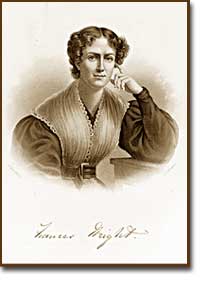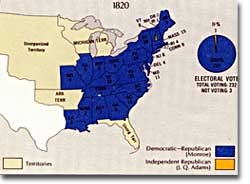How Did Elections Change In The Early 1800s

23b. The Expansion of the Vote: A White Man's Democracy

Frances Wright visited the U.South. from Europe. She wrote of the new American Republic: "Women are assuming their place as thinking beings, non in despite of the men, but chiefly in outcome of their enlarged views and exertions as fathers and legislators."
The rise of political parties as the fundamental organizing unit of the 2d (Two) Party System represented a sharp intermission from the values that had shaped Republican and Federalist political competition. Leaders in the earlier organisation remained deeply suspicious that parties could decadent and destroy the young republic. At the heart of the new legitimacy of parties, and their forthright celebration of democracy, was the dramatic expansion of voting rights for white men.
Immediately afterward the Revolution most states retained some belongings requirements that prevented poor people from voting. Following republican logic, citizens were believed to need an economic stake in society in order to be trusted to vote wisely. If a voter lacked economic independence, then information technology seemed that those who controlled his livelihood could easily manipulate his vote.
Ironically, just as industrial wage labor began to create dependent laborers on a large new scale, the older republican commitment to propertied voters fell out of favor. Equally holding requirements for voting were abolished, economic status disappeared as a foundation for citizenship. Past 1840 more than xc percentage of adult white men possessed the right to vote.

Not merely that, voters could now cast their opinion for more offices. Previously, governors and presidential electors had usually been selected by land legislatures as part of a republican strategy that limited the threat of straight democratic control over the highest political offices. The growing democratic temper of the first decades of the 19th century inverse this and increasingly all offices were chosen by direct vote. The United States was the earth leader in allowing popular participation in elections. This triumph of American politics built upon, but also expanded, the egalitarian ideals of the American Revolution.
This democratic triumph, withal, also had sharp limitations that today seem quite shocking. At the aforementioned time that land legislatures opened suffrage (that is, the right to vote) to all white men, they simultaneously closed the door firmly on white women and free African Americans. This movement was especially disappointing since it represented a retreat from a broader sense of political rights that had been included in some early country constitutions.

James Monroe nearly shut out his Presidential opponent, John Quincy Adams in the election of 1820. Monroe shell Adams 231 to one with three abstentions (balloter college votes).
For example, New Jersey revised its land constitution to abolish property requirements in 1807, but at the same time prevented all women from voting (even wealthy ones who had been allowed to vote there since 1776) every bit well equally all gratuitous blacks. New York acted similarly in 1821 when its legislature extended the franchise to well-nigh all white men, simply simultaneously created loftier holding requirements for gratuitous blacks. As a result, only 68 of the thirteen,000 gratis African Americans in New York Urban center could vote in 1825. When Pennsylvania also denied free blacks the correct to vote in the tardily 1830s, a land legislator explained that "The people of this state are for standing this republic, what information technology has e'er been, a political community of white persons." While he was right about the prevailing racist sentiment among white voters, free blacks with property had non been excluded from the franchise by the earlier Revolutionary state constitution.
Tragically, the democratization of American politics to include virtually universal white manhood suffrage also intensified bigotry past race and gender. The idea of total republic remained likewise radical for full implementation.
Source: https://www.ushistory.org/us/23b.asp
Posted by: mcdanielmorly1947.blogspot.com


0 Response to "How Did Elections Change In The Early 1800s"
Post a Comment